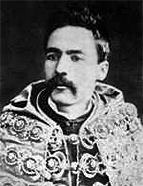

After the regicide in 1908, his life followed a path similar to that of Herculano. He returned to Montemor-o-Novo, seldom leaving his home, and spent his time between his family and readings. He corresponded with figures such as Ferreira Deusdado or Tiago Sinibaldi, and his writings from that period remained within his private circle; all we know is the repulsion that society caused in him. Since 1904, driven by a sense of mission, he had served as a philosophy teacher at the Prince Royal. His teachings were thus aligned with Catholic religiosity, influenced by the neo-Thomism of Sinibaldi, whose manual served as the guide for the prince's education. His dedication to his teaching career, coupled with the prudence of a humanities scholar regarding the challenges facing Portugal, along with his loyalty to the monarchy, brought him to this position.
Understanding who José Joaquim Lopes Praça was requires a journey that takes us back to an era when he was acutely aware of his time, as evidenced by his repeated assertions in História da Filosofia em Portugal and A Mulher e a Vida that what is "is what could have been". It is this condition of possibility, rooted in his understanding of himself, that prompted him to critique what he deemed political utopias, such as those proposed by the socialists, to interpret history in a broader context, and to envision new horizons of possibility in his own way.
Active bibliography: PRAÇA LOPES, José Joaquim, História da Filosofia em Portugal nas suas relações com o movimento geral da filosofia, 3rd ed. rev. by Pinharanda Gomes, Guimarães Editores, Lisbon, 1988 [1868]; Ensaio sobre o padroado português, Imprensa da Universidade, Coimbra, 1869; A Mulher e a vida ou a Mulher Considerado debaixo dos seus Principais Aspectos, 2nd ed., Edições Colibri, Lisbon, 2005 [1872]; Direito Constitucional Português, 3 volumes, Imprensa Litteraria, Coimbra, 1878-1880; O Catolicismo e as Nações Católicas: Das Liberdades da Igreja Portuguesa, dissertation for the competition to teach at the Faculty of Law of Coimbra, Imprensa Litteraria, Coimbra, 1881; Coleção de Leis e Subsídios para o Estudo do Direito Constitucional Português, 2 Volumes, Imprensa da Universidade, Coimbra, 1893-1894; Fichas para a "História do direito pátrio", Gráfica Eborense, 2 Volumes, Lisbon, 2004-2005.
This work is financed by national funds through FCT - Foundation for Science and Technology, I.P, in the scope of the projects UIDB/04311/2020 and UIDP/04311/2020.
